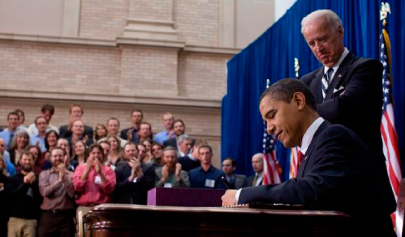March 9, 2009
Legislative Update

Courtesy Wikipedia
President Signs Economic Stimulus Package with Funding for the Arts
On February 17, President Obama signed the American Recovery and Reinvestment Act (H.R. 1), the economic stimulus legislation, which includes $50 million for the National Endowment for the Arts (NEA). The compromise version of the bill approved by the House and Senate before leaving for the week-long Presidents’ Day recess provides a combination of tax breaks and spending totaling $789 billion.
The NEA funding provision stipulates that grants go to activities and projects “which preserve jobs in the nonprofit arts sector threatened by declines in philanthropic and other support during the current economic downturn,” with 40% of the amount going to state arts agencies and regional arts organizations (“in a manner similar to the agency’s current practice”) and the remainder going out in competitive grants from the NEA. Matching requirements are waived. (Learn about expanded funding opportunities enabled by the stimulus legislation that could be available to assist artists and arts organizations.)
In the days leading up to the final votes on the stimulus measure, the fate of the arts funding was uncertain. Although the measure passed by the House included money for the NEA in the original draft bill produced by the House Appropriations Committee, with the leadership of committee chair Rep. David Obey (D-WI) and the advocacy of Rep. Norm Dicks (D-WA), the companion legislation introduced by the Democratic leaders in the Senate carried no arts funding. What’s more, the bipartisan stimulus package eventually passed by the Senate, which had been developed by Sens. Susan Collins (R-ME) and Ben Nelson (D-NE), failed as well to extend any additional support to nonprofit arts programs through the NEA.
Then, during debate on the bipartisan compromise, the Senate passed by a vote of 73-24 an amendment introduced by Sen. Tom Coburn (R-OK) to prohibit any funds in the economic stimulus bill from going to museums, theaters or arts centers for renovations, construction or salaries. Thirty-three Democrats joined all Republican senators voting in favor of the Coburn amendment. The bill passed by the House had already singled out casinos, golf courses, stadiums, zoos and aquariums for exclusion from funds as House leaders attempted to put some controls on the billions of dollars worth of projects on a wish list being proposed by the nation’s mayors. Fortunately, House and Senate negotiators on the final bill dropped the language prohibiting stimulus funds from going to museums, theatres, and arts centers while continuing to exclude support from going to fund projects at zoos and aquariums along with casinos, golf courses and swimming pools.
According to The Wall Street Journal, the proposed prohibition on stimulus funds for museums was inspired by the remarks of the mayor of Las Vegas, who had given a speech suggesting that federal funds could be used for a “mob museum” devoted to the history of organized crime. The Las Vegas museum proposal became a symbol of wasteful spending for those opposed to the economic stimulus package.
Omnibus Funding Bill Sets NEA Increase for FY 2009
Five months after the start of the 2009 fiscal year, the House and Senate are close to an agreement on an omnibus spending measure (H.R. 1105) designed to carry nine unfinished fiscal 2009 appropriations bills through the remainder of the cur rent fiscal year. The bill provides about $31 billion more than was spent on the nine bills in fiscal 2008, an 8% increase. The House of Representatives passed the measure on February 25 by a vote of 245-178, with only 16 Republicans voting in support of the funding bill. The Senate is expected to vote on the measure by mid-March.
The omnibus spending bill, which represents an agreement worked out between House and Senate Democrats, includes $155 million for the National Endowment for the Arts (NEA), an increase of $10.3 million over the fiscal 2008 funding of $144.7 million. The proposed increase would come in addition to the $50 million allocated to the NEA by the economic stimulus bill signed into law by the president in February.
Since the 2009 fiscal year began in October, the federal government has been operating under a continuing resolution holding spending to the FY08 levels. That spending resolution expires on March 6. The $410 billion omnibus appropriations package marks the end of the spending disputes Democrats had with President George Bush, who had threatened to veto the unfinished appropriations bills in disagreement over their funding levels.
Overall, the spending in the omnibus package would provide about $19 billion more than President Bush had requested when he proposed his budget for the nine bills a year ago. Details of the bill were worked out under wraps late last year. Democratic leaders in the House and Senate decided to hold back on bringing the bill forward over concern it might have slowed work on the stimulus bill.
Understandably, congressional Republicans, left out of the drafting of the bill, criticized the measure, which they have attacked as excessive, pointing to programs—of which there are many, including the NEA—that have appropriations increases proposed in the omnibus funding bill on top of increases allocated by the stimulus legislation. House Republicans had urged Democrats to freeze spending for the rest of fiscal 2009 at the 2008 levels.
Obama Outlines 2010 Budget Proposal
On February 26, the Obama administration published an outline of its intended spending priorities for the 2010 fiscal year, to be presented in a fully articulated budget proposal in April. More about spending directions than dollars proposed, the budget outline highlights attention to funding priorities for improvements to the nation’s infrastructure, education, reform of the health care system, and clean energy. Funding for the National Endowment for the Arts and most other individual federal programs will be proposed in the full budget to come later.
Among the tax reform policies included in the budget summary just released is the administration’s plan to limit the amount that high-income taxpayers (those with incomes of more than $250,000 a year) can deduct from their taxes for charitable contributions. The administration has argued that the proposed tax change is aimed at injecting a measure of fairness into the tax code, so that the tax break enjoyed by high-income payers is closer to that given to those in lower tax brackets contributing the same amount in charitable donations.
In this Issue
State to State
- Minnesota: Clean Water, Wildlife, Cultural Heritage and Natural Areas Amendment
- Florida: Arts in Medicine in the Panhandle
- Montana: Artist's Innovation Award
- Ohio: The Arts: Part of the Solution
- Texas: Guide to Programs and Services
- Washington: Wallace Excellence Project & Awards
Legislative Update
Executive Director's Column
Did You Know?
Frequently Asked Questions
SubscribeSubscribe
×
To receive information regarding updates to our newslettter. Please fill out the form below.

